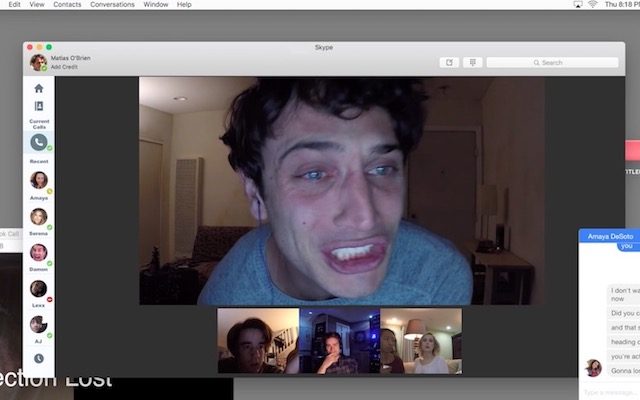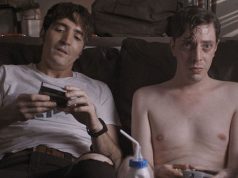
“Unfriended: Dark Web” has no connection to 2015’s “Unfriended” except that they adhere to the same format: Both unfold in real time entirely on someone’s computer screen via their Skype sessions, Facebook chats, and so forth. This structure, a reflection of the “we live online” lifestyle and an outgrowth of the found footage sub-genre, is starting to pop up occasionally — see Nacho Vigalondo’s “Open Windows” (2014), starring Elijah Wood, and the upcoming “Searching,” with John Cho — but there are still a few bugs in the system that keep it from reaching maximal impact. I think it might just take some getting used to, though.
In “U:DW,” a young man named Matias (Colin Woodell) has obtained a new Apple laptop — never mind how — that formerly belonged to one “Norah C.,” whose Facebook account is still receiving messages indicating she was into some shady catfishing business. Matias is using the computer to develop an app that will translate speech into sign language, for the benefit of his deaf girlfriend, Amaya (Stephanie Nogueras), with whom he converses on Facebook Messenger.
Meanwhile, Matias’ other friends — conspiracy theorist AJ (Connor Del Rio), lesbian couple Serena (Rebecca Rittenhouse) and Nari (Betty Gabriel), Londoner Damon (Andrew Lees), and musician Lexx (Savira Windyani) — are gathering for game night via Skype group chat. With the dexterity of one raised on the Internet, Matias participates in game night while also maintaining a chat window with Amaya (who’s mad at him) AND investigating whatever “Norah C.” was up to.
Suffice it to say that there is material on the computer that its former owner wants back NOW. Matias has no choice but to tell his Skype friends what he’s found, putting them in the same web he’s stumbled into. The unseen villain, part of the Internet’s black market and one of those movie hackers who can make computers do anything, can see and hear everything in the Skype chat, knows where all of Matias’ friends are IRL, will kill them if they log off or call the police, yada yada. (“You millennials love the Internet so much? Well, now you can NEVER LEAVE!” the movie seems to cackle.)
Writer-director Stephen Susco depicts computer interfaces and usage accurately (which is surprisingly rare in movies), as long as you suspend your disbelief about how quickly applications launch and how fast everyone’s Internet connection is. A few elements are too much, though. When the villain shows up onscreen (e.g., lurking behind someone on their webcam), he — but not the entire image — flickers like a ghost, a gimmick that doesn’t make any real-world sense. Sinister developments in the story are often accompanied by a rumbling in the soundtrack, which feels like a cheat in a movie where all other sounds come from the characters and their environments. It’s amusing, too, how often Matias will point his cursor at the part of the screen where the important information is, to make sure we’re seeing it.
There are no great performances here, but everyone in the cast is committed to the high tension of the scenario, which is often broken, humorously, by the intrusion of real life. (AJ thinks the bad guys have come for him, but it’s just his mom coming downstairs, because of course AJ is in his mother’s basement.) The plot involves some exceedingly creepy ideas, including human trafficking and snuff films, but Susco avoids showing anything graphic, even when you think he’s going to. (The filmmakers were clearly hoping for a PG-13 rating, going so far as to have the characters watch their F-bombs, but to no avail.) Consequently, though we’re meant to be freaked out by the horrific things trafficked on the “dark web,” we’re denied the opportunity to be truly shocked.
In the end, I never took the movie seriously enough to be disturbed by it. These awful events transpiring and being discussed in the same ordinary windows and programs we use every day on our own computers is too great a juxtaposition. It’s like using a Speak & Spell to write Satanic curses — the message may be scary, but the medium is inherently mundane. It’s fun to go along with the bit, though, and a reminder of why I never use the Internet.
C+ (1 hr., 28 min.; )





